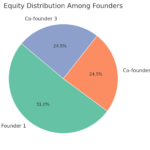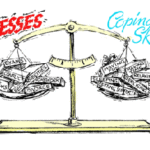
A recent study conducted by researchers from the Oxford Internet Institute, University of Oxford, University of Technology Sydney (UTS) and the University of Melbourne examined data from over 21,000 startup founders, formally identifying six key startup founder personality types associated with success.
Notably, the research indicates that the collective personalities of a startup’s entire founding team significantly influence the venture’s outcome.
Now, arguably, we know this. Most of the articles citing the causes of failure lie in the team (poor execution, lack of focus, misaligned expectations, different work ethic, or inconsistent values) but society seems to continue to argue incessantly about whether or not we can teach people to be entrepreneurs, even failing to agree on what it means to be an entrepreneur. We have books written about Grit, Tenacity, Purpose, Passion, and Mission, and yet many (most?) founders seem fixated on owning their own business, making money, or developing their solution; fixations that have little to do with what it actually takes to be successful as a founder.
Has this research uncovered clarity that we might use to help founders understand if they have a shot? Might we more clearly distinguish and agree on what it means to be “entrepreneurial”? Can this insight help founders find co-founders and develop a team of people that complements not just their skills and experience but also their personality traits – making success much more likely?
“There are valuable lessons here about the importance of fostering a variety of personality types within teams.” Paul X. McCarthy, one of the published researchers, clarified in Science Daily, “We estimate that around 8% of people worldwide may possess personality traits conducive to being successful founders, and many of them might not be engaged in entrepreneurial pursuits at present.”
Interesting isn’t that? 10% of startups succeed… entrepreneurial people are considered quite rare in fact… and around 8% (coincidence?) of people worldwide possess the personality traits they’ve identified that correlate with success.
When “experts” (yes, I mean to put that in quotes as I find the term is subjective) ponder the attributes that contribute to the success of startup founders, a plethora of opinions and metrics emerge. Some propose three specific personality traits and four distinct founder types, while others favor the Big Five traits or even suggest a list of six, seven, or as many as 16 diverse personality profiles. I, frankly, hold some credence in Myers-Briggs and my ENTJ association; and yet, I’m constantly in discussions with those who think Myers-Briggs is bunk.
Published in the journal Nature Scientific Reports, the recent study asserts that successful founders exhibit personality traits that deviate from the norm in the broader population (very consistent with how I distinguish “entrepreneur” from business owner or even founder – rare, unusual people who deviate from the norm). Six specific personality types they’ve collectively summarized as “FOALED” (Fighters, Operators, Accomplishers, Leaders, Engineers, and Developers), demonstrate a stronger predictive power for success compared to other conventional factors commonly assessed by the business world. For instance, their personality-based metric is purportedly five times more predictive of success than industry affiliation and twice as predictive as the founder’s age (referring to the fact that there is a much higher correlation between age and success with a startup than most might hope; simply, be 44 years old).
Lead author and adjunct professor at the University of New South Wales, Paul X. McCarthy, emphasized the significance of personality traits in the success of startups.
In their study, the researchers and authors reported that their algorithm accurately distinguished successful founders with an 82.5% accuracy rate. They gathered data from Crunchbase to evaluate the success of startups, considering factors such as mergers, fundraising, acquisitions, and IPOs, drawing data assessing personalities from behaviors on social media.
These traits include a desire for variety and novelty, an openness to adventure, reduced modesty, and heightened energy levels. The paper concludes that the more a startup team exhibits these traits, the greater the likelihood of success.
Now, let me clarify something they also made clear. They didn’t say that the founder(s) must have these attributes but rather that their research finds that the founding team is much more likely of success if they do, meaning that if that isn’t you, find someone who is, “Firms with three or more founders are more than twice as likely to succeed than solo-founded start-ups,” added Oxford researcher, Fabian Stephany.
“Let’s “assume” that their research is even half correct – those are still high numbers worth consideration.” Wade Allen, who specializes in transforming businesses through talent, “Can start-ups think deeper about how they start and how they grow?”
the Ensemble Theory of Success
Startups that encompass a diverse mix of founder types have a significantly higher probability of success (and I found that notable because of the already recognized value of gender/race/age diversity in teams), with 8 to 10 times greater odds compared to companies led by a single founder. Diversity ABSOLUTELY matters; and with an 8-10x greater chance of success, one could argue that diversity of personality is critical. This observation led the researchers to introduce a concept they’ve termed the “Ensemble Theory of Success.” This theory aligns with other commonly embraced notions in the startup community, such as the Three Hs (“hipster, hacker, hustler”), initially coined by AKQA’s chief creative officer, Rei Inamoto, in 2012. According to these concepts, a successful startup typically consists of a founder who embodies a trendy persona, another who excels in programming, and a third who possesses unwavering dedication to hard work – as I once explored it, The Butcher, The Baker, and the Candlestick Maker.
The point in what I, at least, consider conclusive finding is not that you must have these traits to find success as a founder but that indeed, we can determine if your startup is very likely to fail if your core team lacks among them a desire for variety and novelty, an openness to adventure, reduced modesty, and heightened energy levels.
What this guides for would-be, early-stage founders, is that priority one is not likely talking to customers, studying the market, nor building that MVP, but rather ensuring you find the Fighters, Operators, Accomplishers, Leaders, Engineers, and Developers who do.







Great piece! Know yourself….so important! Thank you Paul O’Brien.
Great work and insights here – certain traits make you more likely to succeed. Although having them doesn’t guarantee success, you probably should ensure you have them if they increase your chances.
Such a great read!
Nice
Thanks for sharing.
Wade, one of the distinctions about our work in MediaTech Ventures, to startups and ecosystems, is that we’re not in the business of making startups successful – anyone who says they can do that is lying. We’re in the business of teaching founders, building the ecosystem, and drastically reducing the risks, so that founders have the best possible chance of finding success.
Great points as always from Paul O’Brien on Startup Founders!
Thank you Meghan, it was rather awesome to discover that formal research has been done to help establish what I’ve had this Moby Dick White Whale kind of fixation over about using the word “entrepreneur” properly. It’s horrifically misleading of society to claim, encourage, or teach that everyone can be an entrepreneur. You can start a business and you can be a founder, but the entrepreneur is that rare (apparently 8%) slice of the population is just a different personality type from most.
Absolutely. I think it’s key for those that are working within the ecosystem to understand the difference, be cognizant of the peaks and valleys in a better light, which all help support the mission and maneuvering one must make either as a founder or team member.
The five factor model is so nuanced — good for homogeneous groups!!
Have you seen great works, studies not opinions, about the 5 factor for startups / founders?
Yes. And I have one too! The model lends itself to measuring populations because each facet is scored 0-100.
Amen! Just the message for the age of Industry 4.0 except that Industry 4.0 will involve a cohort of mentors, scientists, investors, innovators, and customers who will be viable up to maybe, age 200, enjoying multiple life styles, aware of many, new others – thus is the prognostication of Peter Diamandis. Where will you get the vision for innovation vis a vis age/life category, breath of world knowledge, and proven success?
Thank you for the interesting perspective. Our businesses are made up of a variety of personalities which we need to build a dynamic business.
What I have found in my 26 years of interactions with clients was the question raised by Wade Allen in the article “Can start-ups think deeper about how they start and how they grow?”
Unfortunately this is the phenomenon found in most businesses. No Critical Thinking happens. We believe that we can solve today’s problems with yesterday’s thinking and methods. So the default is going back to old and stale thinking. Why? Because we don’t want to go outside comfort zones. So we become stale and me too.
Start ups have to think differently as they don’t want fail. So their thinking is more critical. As leaders we have to challenge our people who are different in personality to develop the one common trait we all should have, to be a critical thinker.
Greg, I believe critical thinking is the most critical skill we develop in our kids, and I think our schools are failing and falling behind in doing so.
[…] of Oxford, University of Technology Sydney, and the University of Melbourne which found that founding teams that have a need for variety and novelty, reduced modesty, an openness to adventure, and heightened energy […]
True Entrepreneurship is not just about thinking differently, it’s also about finding the entrepreneur who can both think different and execute. Thats when everyone typically gets on board, with your clear vision so you can swiftly duplicate the efforts and scale. GRIT, by Angela Duckworth explains it quite well. It’s a must read for all founders.
[…] about a month ago, I ran at an assessment of a study conducted by Oxford Internet Institute, University of Oxford, University of Technology Sydney (UTS) […]
[…] rather conclusively that success is all but determined by the team in place, and that there are certain personalities, skills, and experiences that contribute to success, or assure failure. This has my head spinning […]
[…] recent study conducted by researchers from the Oxford Internet Institute, University of Oxford, University of […]
[…] light of recent research establishing with near certainty that personality traits correlate with success (or failure) as a startup […]
[…] investing in, or working in startups IS NOT THE SAME as supporting businesses. Evidenced by Oxford’s study of successful startup founders, people all but must have a need for variety and novelty, reduced […]
[…] of this is well researched. We know which personality types tend to perform as entrepreneurs and which personality types work well together. We know […]
[…] owners. But historically, entrepreneurship referred not to the act of owning a business but to a specific set of personality traits: resilience, a high tolerance for risk, and a fixation on improvement without necessarily seeking […]
[…] conclusively that success is all but determined by the team in place, and that there are certain personalities, skills, and experiences that contribute to success, or assure failure. This has my head spinning […]
[…] to services and innovation. This foundation fostered a culture of ingenuity and resourcefulness — traits critical for entrepreneurship. Today, the island’s tax-friendly policies, such as Act 20 and Act 22 (now consolidated into […]
[…] personality is one of the primary determinants of entrepreneurial success. Founders who align with entrepreneurial personality profiles — often understood through models like Myers-Briggs, DISC, Enneagram, or the Four Temperaments […]
[…] or flirtatious; it isn’t something someone decides to be, rather, it defines who they are. A recent study of 22,000 startups uncovered that about 8% of the population is what you might consider entrepreneurial: these people […]
Nice post: I recently wrote about another study that found that one of the most significant predictors of startup survival is founders’ personalities.
It showed that a bigger, more diverse team increases the odds of actually surviving and thriving. It’s not just about having one visionary leader but mixing personalities that bring new ideas, different sources of energy, and just enough friendly debate to push everyone forward.
I still frequently debate with people that co-founders are more successful than a founder. Thanks for sharing this Jim Berkowitz
[…] pulling from personality research, venture outcomes, and ecosystem data. Academic work, including research coming out of Oxford University and aligned institutions, keeps reinforcing the same point: certain traits […]